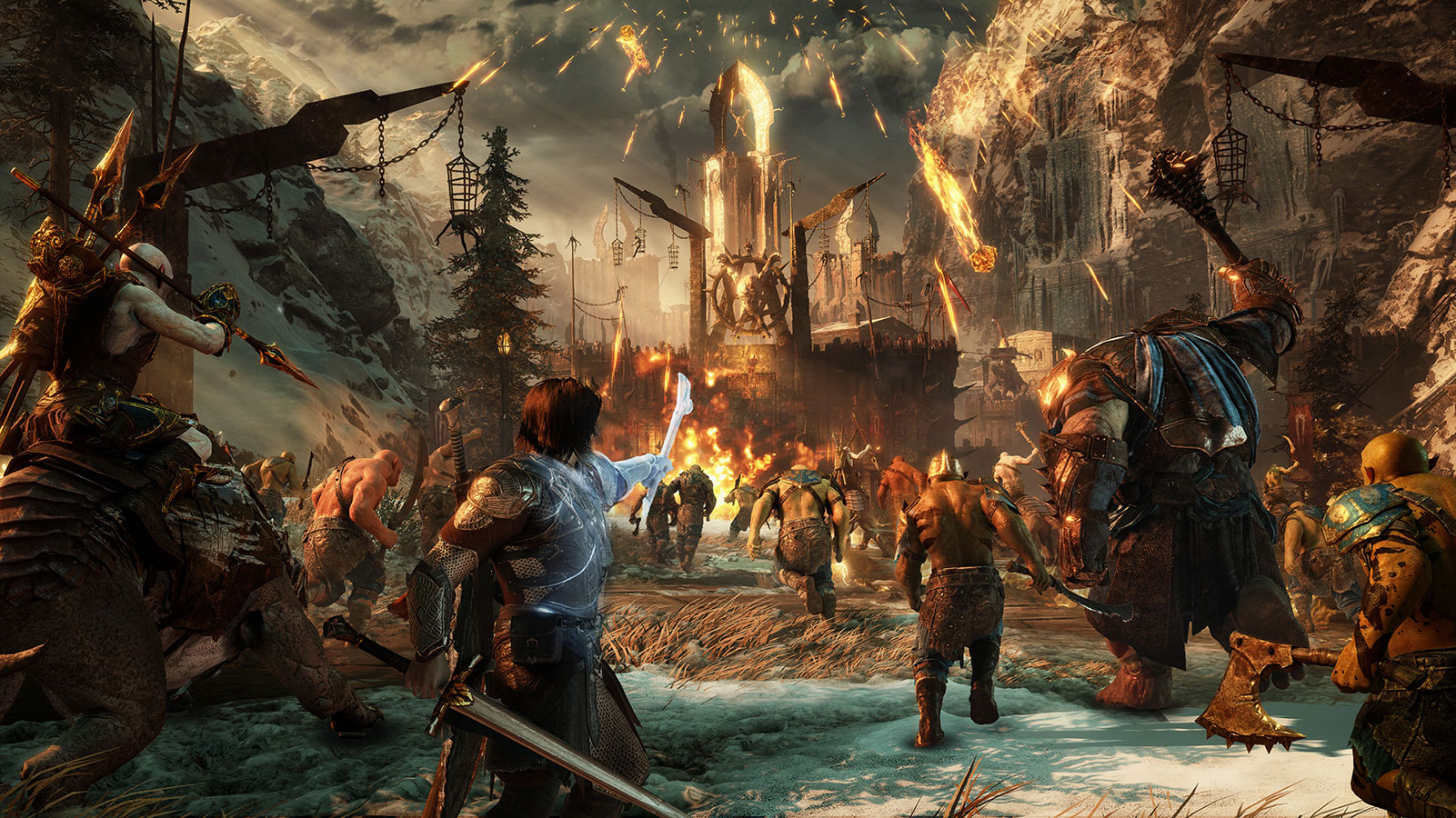The Most Disappointing Video Games Of 2017

2017 was a fantastic year for video games, but there were still some pretty big letdowns.
—
December 26, 2017.
This list, in spite of its headline, tackles not just video games but also video game technology. However, many games on this list also had redeeming qualities and provided hours of enjoyment.
Here are the top twelve disappointments of 2017:
12. Lawbreakers – Boss Key Games [Added]
When Cliff Bleszinski broke out on his own, leaving Epic Games and Gears of War to start his studio, gamers had high hopes. What would the storied game designer come up with? LawBreakers were Cliffy B’s first venture after departing Epic and, well, despite its edgy characters, high-octane gameplay and slick graphics it fell flat on its face. The game’s concurrent player counts are in the teens as of this writing. It’s a real shame. There’s nothing terrible about the game; it’s just not great or exciting either. Perhaps more than anything, it’s terrible news for anyone hoping for a comeback of the arena shooter genre.
11. Wolfenstein II: The New Colossus – Machine Games
There were many things I did love about this game, which is basically why it’s in the #11 spot rather than further up the list. I still felt like it was a major step backward from the original rebooted Wolfenstein game. Everything from the level design to the missions themselves felt more constricted and less amusing than before. The story had its moments, but ultimately felt rushed by the end. And I’ve come to realize—both thanks to this game and Call of Duty: WWII—that I’m not a fan of picking up health packs all the time. If a game isn’t going to do recharging health, it needs a more elegant solution than continually clicking and picking up stuff. The estus flasks of Dark Souls, for instance. In any case, I think this was still a good game, but it just didn’t come close to matching my expectations.
10. 1-2 Switch – Nintendo
Nintendo had a banner year in 2017, but its launch app 1-2 Switch was pretty bare bones for a game you had to pay for. If it had been a free app included with every purchase of the Nintendo Switch, it would have been a great little set of mini-games to demo what the Switch could do. My kids certainly had a blast playing it this past year, and some of the mini-games are cute (and cute to watch the kids play.) But it’s just not enough of a game to charge people for it, and it’s disappointing that Nintendo didn’t give it away.
9. Animal Cross: Pocket Camp – Nintendo
Nintendo’s entrance into mobile has been a bit of a mixed bag. Super Mario Run was a fun game, but its revenue model upset everyone. Fire Emblem: Heroes was by far Nintendo’s most successful mobile game so far, but the gacha micro-transaction model leaves much to be desired. (I still found it pretty fun for a mobile game.) But Animal Crossing: Pocket Camp is just disappointing all around. This should have been Nintendo’s most significant mobile hit; instead, it’s only not very good, but it also doesn’t appear to be generating much revenue for Nintendo either. Swing and miss.
8. Virtual Reality – Multiple Devs
Okay, it’s not a game. But the virtual reality for gaming remains a massive disappointment in the final days of 2017. Yes, there are some cool VR apps out there. I still enjoy playing Keep Talking, And Nobody Explodes, and I enjoyed Sparc and Superhot VR. People keep saying Skyrim is cool in VR, but I’ve had my fill of Skyrim. More than anything, virtual reality has once again proved itself to be a pretty unsatisfying technology for gaming. It might be great for any number of other things, but video games just don’t work as well in VR. It remains a gimmick—even a fun trick at times—but not worth the investment. I honestly keep my two headsets (Rift and PSVR) boxed up most of the time.
7. Steam – Valve
Once again, this isn’t a “game” instead it’s a whole lot of games. In fact, as of this writing, 7249 games have been released on Steam in 2017. That number will rise before January 1st, 2018. That’s way too many games. When Steam got rid of Steam Greenlight and moved to Steam Direct (which allows people to pay a $100 fee to have their game added to the Steam store), it was ostensibly to better stem the tide of crapware. It didn’t work—in fact, it probably made things worse, as Jim Sterling eloquently notes. Steam may be my biggest video game related disappointment of the decade. And it remains disappointing in 2017.
6. For Honor – Ubisoft
Man, For Honor looked so cool when it was first announced. Knights, Vikings, and Samurai are doing battle against one another across gorgeous looking arenas. Brutal PvP combat and some PvE tossed in for good measure. But the problems just kept piling up once the game was launched. From network issues and shoddy matchmaking (the game uses peer-to-peer servers instead of dedicated) to over-powered moves/classes and a lackluster campaign, For Honor just didn’t live up to the promise. Many gamers were upset by the game’s revenue model as well, which combined a full retail price of $60 with micro-transactions and a season pass. For my part, I just found that the combat grew tiresome reasonably quickly and that all those pretty graphics were wasted on a somewhat unsatisfying experience.
5. Middle-Earth: Shadow Of War – Monolith / Warner Bros.
I gave up on Shadow of War once I realized just how long it was going to take to beat the game—and how repetitive that experience was going to be. To make matters worse, it certainly appears to have been built this way in order to encourage players to buy loot boxes. Yes, this full-priced AAA video game included pay-to-win loot boxes even though it’s single-player. The game also looked like a graphical downgrade from its (far superior) predecessor Shadow of Mordor. Topping all this off, I found the story, replete with “sexy Shelob” to be far more cringe-inducing than the first game, such a wild departure from anything remotely like Tolkien’s work that it can barely pass as fan-fiction. While the mechanics are still fantastic—and movement, in particular, was a step forward compared to the first game—it wasn’t enough to combat the tedium.
4. Destiny 2 – Bungie
Destiny 2 did many things right in terms of quality-of-life improvements from the first game. It also launched with a much, much better campaign. Unfortunately, adding a map and some actual cut-scenes wasn’t enough to offset all the other problems with the game, from its new weapon loadout to the reliance on loot boxes (bright engrams) and lackluster end-game. Perhaps worst of all, the game just felt way too much like year 4 of Destiny rather than something truly new and different. No new classes, no new alien species, and graphics that looked almost identical all made the game feel too familiar. I still enjoyed Destiny 2, but I was hoping for more. Meanwhile, Bungie’s handling of post-launch issues has itself been pretty disappointing.
3. Yooka-Laylee – PlayTonic
I’d been watching the cool indie platformer for some time before its launch, and it looked like a fantastic, retro game and spiritual successor to the old Banjo-Kazooie games. Unfortunately, the game played too much like its inspiration. Rather than take an old concept and give it new life with modern game design ideas, Yooka-Laylee took the concept too far. The game felt like something plucked out of another era, and not in a good way. Clunky controls and an unforgivable camera combined with some of the most irritating “voice-acting” I’ve ever heard and uninspired level design left me utterly disenchanted with the game.
2. Mass Effect: Andromeda – BioWare Montreal
We’ll always remember Mass Effect: Andromeda for two reasons. First, the truly awful facial animations and the many memes they spawned. And second, as the game that may very well have killed the Mass Effect franchise for good. There were many things about the game that I did in fact like, but overall it was proof that Mass Effect should stick with compelling stories and characters rather than grindy open-worlds. It’s also another piece of evidence that EA and DICE’s Frostbite game engine is lousy for RPGs (it’s designed for first-person shooters.) That engine has proven disastrous not only for Andromeda, but also for Visceral’s cancelled Star Wars game and, to a lesser degree, for Dragon Age: Inquisition. Whatever the case, Mass Effect: Andromeda failed to live up to the original trilogy’s critical acclaim or sales and both BioWare: Montreal (which was shuttered after the game’s release) and Mass Effect have suffered the consequences.
1. Star Wars: Battlefront II – DICE
The year’s most controversial game, Star Wars: Battlefront II could have been great if it weren’t for the monetization scheme at the heart of its design. EA and DICE crafted a beautiful shooter that’s insanely frustrating to play thanks to its loot crates—even after EA turned off the paid micro-transactions within the game. And even beyond this fundamental game-breaking issue, I still find these new Battlefront games to be disappointing from a gameplay perspective. They’re prettier than the original games, but not as good. If nothing else, I still wish that DICE had just taken everything great about its Battlefield games and given them a Star Wars makeover. That would be a game worth playing.

By Erik Kain
Read original article at forbes.com

Recent Comments